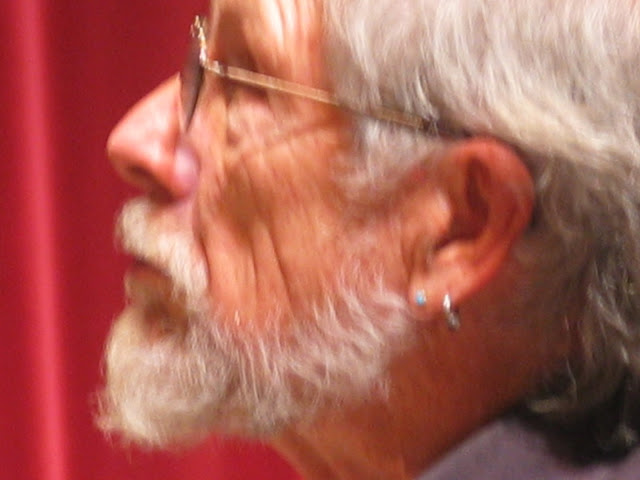 |
| Gary Snyder at Bellingham High School, 2004 |
"In the fall of 2004, I heard Gary Snyder read from his most recent collection of poems, Danger on Peaks. In a calm, steady tone, Snyder delivered his selection to what is likely the most attentive audience that the Bellingham High School auditorium has ever boasted. His poetry is renowned for its ability to arrest and articulate specific moments in nature. The simplicity and clarity of Snyder’s rendering almost masks the careful rhythm, which implicitly structures his voice. His work blends respect for the natural world with Zen Buddhist thought, achieving truly innovative modes of telling.
Snyder was born in San Francisco and grew up in the Pacific Northwest. Over the years he has undertaken many endeavors: he was a logger in his youth, he studied anthropology at Reed College, then Chinese language at Berkeley, and Buddhism while living in Japan. In the late 1950s, he was influential in the Beat Generation/San Francisco Movements (along with Ginsberg and Kerouac). Snyder is now the critically acclaimed author of sixteen collections of poetry and prose and was awarded numerous literary prizes, including a Guggenheim fellowship (1968) and the Pulitzer Prize (1975). Until recently, he taught Creative Writing and literature as a professor at UC-Davis.
Snyder and I met on the morning following his reading in the lobby of the Fairhaven Inn in Bellingham....
Anne Greenfield: You mention Bellingham in Mountains and Rivers Without End and, more recently, in Danger on Peaks. How did you come to know Bellingham and how has this relationship changed over time?
Gary Snyder: I was raised on a little dairy farm just north of Seattle, through the thirties and up early into WWII. The country between Seattle and the Canadian border was mostly dairy farming or logging in those days. We had a little dairy farm, so in our spare time when we wanted to go out and travel and look at things we would go look at dairy farms. That would bring us all the way up here once or twice to Bellingham, Sedro-Woolley, up the Skagit Valley, Mount Vernon, and back down. That’s my first memory of Bellingham.
Later, from the age of fifteen on, I started mountaineering. And one of those summers (I think 1946 or 1947) I came up with some Mazamas (a climbing group from Portland, Oregon) to climb Mount Baker. And I worked in the forest service, up the Skagit, in the summers of 1952 and 1953, when it was still the Mt. Baker National forest. I often came to Bellingham with friends, particularly one friend who I’m going to meet for dinner tonight: Jack Francis, who’s lived in Bellingham all these years. I came through here with Alan Ginsberg in 1966 on my way to British Columbia.
So, Bellingham has been in my consciousness as part of Ish Country (the Puget Sound region) and the culture of Maritime Northwest Pacific.
AG: Speaking of sense of place, much of your work is grounded in and speaks to location and specific places. In fact, your recent collection takes up the 1980 blast at Mount St. Helens. Have the recent eruptions there triggered anything new for you?
GS: Well more thoughts of the same. Pacific Rim Circle of fire: the chain of volcanic activity down the west coast as far south as Mount Lassen, actually as far south as Mono Lake. The actual instability of the earth’s crust and that fact that every volcano that exists on the west coast is more apt to erupt again than any place that doesn’t exist as a volcano already. Mt. St. Helens – if you look at its history- which I did – erupts every few centuries. It has been erupting every few centuries for some time. Mt. Rainier is quite capable of doing a major eruption at any time. So this is part of our life here. Except, being very short lived creatures, human beings, and being new to the region – that is to say the present American population has only been here for a hundred and fifty years – we don’t have much consciousness of it. I am exploring what that consciousness would tell us. So, having some recent events at Mt. St. Helens is hardly surprising. It’s part of the story and the story goes on. Who knows what comes next?
AG: Danger on Peaks has been deemed your “most personal collection yet.” To what degree do you see your poems as autobiographical?
GS: I’ve never written autobiographical poetry as such. On the other hand, whatever one does in poetry has to be grounded in deep personal experience. But personal experience is not necessarily autobiographical experience because we are all vertebrate mammals. And we live in very much the same body and the very same mind. To be grounded in your body is not autobiographical. And to be aware of the world is our mutual heritage, but not everybody sees it immediately and clearly. Which is something that my own artistic inclination, plus my Buddhist practice, pushes me towards: mindfulness in the present moment."
From "Grasping the Natural: A Conversation with Gary Snyder" by Anne Greenfield, published in 2004 in the Bellingham Review. Photo copyright Christian Martin.
No comments:
Post a Comment